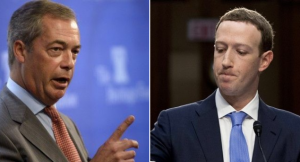Nigel Farage put Mark Zuckerberg on blast today during the Facebook CEO’s testimony to the European Parliament, accusing him of “willful discrimination” against conservatives on the platform, and positing the creation of a “Social Media Bill of Rights” to protect free speech.
Farage noted that the victory of Brexit in the UK, the election of Donald Trump in the US, and the recent victory of populist politicians in Italy could not have happened without social media.
“Historically, of course, it’s true, that through Facebook and other forms of social media there is no way that Brexit or Trump or the Italian elections could ever possibly have happened. It was social media that allowed people to get round the back of mainstream media.”
“Perhaps you’re horrified by this creation of yours and what it’s led to, I don’t know. But what is absolutely true is that since January of this year, you’ve changed your modus operandi, you’ve changed your algorithms, and it has led directly to a very substantial drop in views and engagements for those who have got right-of-center political opinions.”
Farage went on to reference the steep decline in engagement on President Trump’s Facebook engagement that immediately followed the Facebook algorithm change, a story originally reported by Breitbart News, as well as the broader decline of conservative Facebook pages following the changes in January.
“The facts are very clear. Just look at President Trump’s numbers, on a much smaller scale look at mine, look at thousands of other conservative commentators. On average, we’re down about 25 percent over the course of this year. That’s happening on a ‘platform for all ideas.’”
“I am not talking here, Mr. Zuckerberg, about extremism. I am not talking about encouraging violence. I am not talking about hatred of anybody. I’m talking about people who have majority, mainstream opinions … and frankly, I feel, they are being wilfully discriminated against.”
Farage called on Zuckerberg to be more transparent about the factors that go into judging content on Facebook.
“What interests me is who decides what is acceptable? Who are these people you referred to earlier, these third-party fact checkers, who are these people? Why is there no transparency in this process at all?”
“I’m not generally somebody who calls for legislation on the international stage, but I’m beginning to wonder whether we need a social media bill of rights to basically protect free speech. I’m asking you today, very, very clearly that would you accept today that Facebook is not a platform for all ideas that is operated impartially?”
Source: breitbart
Ask me anything
Explore related questions





